By using our website, you agree to the use of cookies as described in our Cookie Policy
a
Rss Feed
Airbnb and Property Management: All You Need to Know
 Property Management
Property Management
It’s hardly an earth-shattering realization that Airbnb has disrupted the short-term rental market. The idea was never expected to take off - but take off it did as Airbnb made it simple for ‘hosts’ and ‘guests’ to connect. It's very similar to Uber and Lyft - connecting demand with supply.
But that’s the core idea behind Airbnb - it was never aimed at the long-term rental market but mimicked (and simplified) the business model of hotels and resorts. There are key differences in property management for landlords if they decide between long-term and short-term leases.
Rental Income
Landlords can either make more money with an Airbnb than they would with a traditional lease or they may not make any money at all. It can go either way, depending on the type of market and the season. For example, if your property is located in an area with heavy tourism, then your property may fetch a higher rental income on Airbnb.
The disadvantage is that there is no such thing as a guaranteed rental income. A guest will book your home for one day, leave the next, and never return. There is no telling when or if, the property will be rented again. This will be a key disadvantage of using Airbnb - your property is like a smaller version of a hotel and occupancy rates will be highly unpredictable and dependent on market conditions.
However, Airbnb makes it easy to get paid using online or credit card payments with timely transfers. Other apps can help you collect the rent, including PayPal, Zelle, and Venmo. Note that your tax burden on Airbnb will be different than with traditional rental income. You will most likely pay a self-employment task on any income from Airbnb.
A more traditional model may give you more tax breaks on the rental income. This may be a strong incentive to not use Airbnb at all.
Maintenance Differences
This is a major difference between Airbnb and traditional renting. Regular tenants know they have a legal responsibility to keep the property in good condition and they also have a financial incentive (the security deposit). This means that your property is less likely to be misused and abused by long-term tenants.
Compare this with Airbnb, where guests will leave within the day, or week at most. They may be less likely to look after the property.
On the flip side, Airbnb will give you more access to your rental unit, including the option to make repairs in a timely manner.
You should ask yourself an important question: are you ready to deal with new tenants every week - or every day? If the thought makes you feel a little uneasy, then perhaps Airbnb isn’t for you.
Also, if you cringe at the thought of cleaning up after guests, making repairs, managing communications, and stocking amenities - just like at a hotel - then Airbnb is definitely not for you. The overhead costs may be too much for you.
Marketing Differences
This is another major difference - Airbnb will do all of the marketing for you. The platform is very similar to a service like Zillow; you still have to take good pictures and write a good copy. However, the marketing will be taken care of by the algorithm.
Airbnb has the incentive to give you access to more applicants - which both landlords and property managers agree is a stressful and time-consuming part of the job. This means you will have access to a healthy trail of leads round the clock.
With that said, most property managers can streamline marketing with the aid of rental management software to advertise the rental unit on major listing platforms.
The Bottom Line
To wrap up, both Airbnb and regular renting have their advantages and disadvantages. You can choose between either business model depending on local demand, where you live, the tourist industry, and what your property manager has to say. If you have access to a never-ending list of leads for short-term stays at your property (perhaps due to tourism), then Airbnb may be for you.
Let us know your thoughts in the comments below.
If you haven’t hired a property manager already, click here to learn more about our services and how an experienced property manager can share some of your burdens.
‹ Back






.png)
